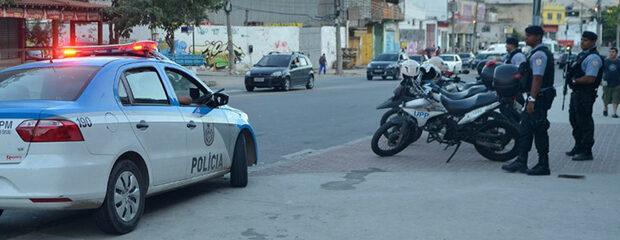
For the original by Marsílea Gombata in Portuguese, published in Carta Capital, click here.
As Rio citizens vote Sunday, militias act discreetly and go back to supporting candidates rather than running for office themselves.
Aside from the R$48 (US$20) that she has to pay each month for the gas supply to her home, I.S., 50, also pays R$5 to receive the mail that is addressed to her or her husband. For the past ten years, the same group of militias has controlled the gas supply, mail, cable TV reception, local van transport, and even which candidate she should vote for. These militias are led by former civil security or police officers who now control various parts of Rio de Janeiro. The exploitation that I.S. is subject to every day is not exclusive to where she lives in Pedra de Guaratiba, in the West Zone. Militias are present in over 170 other areas within Rio de Janeiro state, some where Police Pacifying Units (UPPs) have been installed.
Besides territorial control, the militias perform public functions related to criminal interests. State representative Marcelo Freixo, presided over the Congressional Investigation (CPI) into the militias in the Legislative Assembly of Rio de Janeiro (Alerj), and says this shows that militias have an interest in power as well as economics. “This is a criminal organization that mixes their territorial power with their electoral power, something that the drug traffickers never managed to do in Rio de Janeiro,” he points out.
Unlike the drug trafficking gangs that used to control territories now controlled by the UPPs, the militias have already managed to elect city council members and state deputies of their choice, interfere in the mayor’s race and are decisive in elections for governor. “You just have to go into militia areas to see legions of voters who are organized by them. Drug traffickers never managed to organize this or have anyone elected,” Freixo adds. To illustrate his point, Freixo mentions the 2010 Brazilian Republican Party (PRB) candidature of “Cidinho,” the brother of Marcelo VP, former leader of the Red Command drug gang, currently imprisoned in Catanduvas. Cidinho, hoping to become a state representative, was not elected: he got only 8,000 votes in (his focal area of) Complexo do Alemão, a complex of favelas that has 65,000 inhabitants.
The militias opted to take another route. In 2008, they successfully elected the brothers Jerominho (João Guimarães Filho) and Natalino José Guimarães to the positions of city council member and state deputy, respectively. Today, the militias have changed their strategy and no longer risk putting anyone directly into electoral races. Instead, they support candidates. “The very bosses of the ‘Justice League’ were candidates, which cost them dearly due to the high exposure. They got tired of helping others reap the rewards, and decided they wanted to be elected themselves, but they ended up in prison,” Freixo says. “In this election, we can see they are returning to (the strategy of) supporting candidates so that their enterprises will (not be threatened but) be maintained. That way, they are less exposed,” he adds.
Ignacio Cano, from the Violence Analysis Laboratory at Rio de Janeiro’s State University, also sees a change in strategy. Author of Hidden: The Evolution of the Rio de Janeiro Militias (2008-2011), Cano explains that, given the sentencing of candidates identified as militias, the idea is to not attract too much attention and to stay in a position on the sidelines. “That does not mean, however, that in a variety of communities they are not the ones who decide whether or not a candidate can run. That sort of control still exists,” he explains.
The heyday of militia activity was in 2006-7, a time when some politicians–such as then-mayor Cesar Maia–supported these organizations as “community self-defense.” In 2008, the kidnap and torture of O Dia journalists who were investigating militia activity in Batan, a community in Realengo in Rio’s West Zone, made visible that there were criminal actors among the state.
As such, despite being exercised more discreetly, their influence has not waned. On September 12, the Regional Electoral Tribunal of Rio found boxes containing lists of PMDB and PSDB candidates’ supporters and promotional material in the community neighborhood association office in Águia de Ouro e Guarda, in Del Castilho in the North Zone. The operation investigated allegations of the illegal influencing of elections by militias. Two months ago, a re-election candidate for state representative filed a complaint when she was threatened by an armed man when putting up campaign posters in Águia de Ouro. Moreover, she confirmed militias levied a charge of R$100,000 on those interested in campaigning in their areas.
Anyone who tries to advertise in militia-controlled areas without knowing the rules ends up being threatened. “Try going into a militia area and putting up a poster. They won’t have to shoot–you just simply won’t put your poster up. What gets put up is exclusively the information about the candidate who is economically involved with them,” Freixo confirms. A candidate for re-election himself, Freixo avoids certain areas and has private bodyguards for his own safety.
He explains that, unlike traffickers, militias are not confronted by the state since they are the state. “Their logic is not one of war but rather of controlling economic power and community infrastructure, such as local transport, gas supply, and other things,” he says. “Confronting the militias should be done by the police and by economically stifling them, something that has not yet been done,” he concludes.
